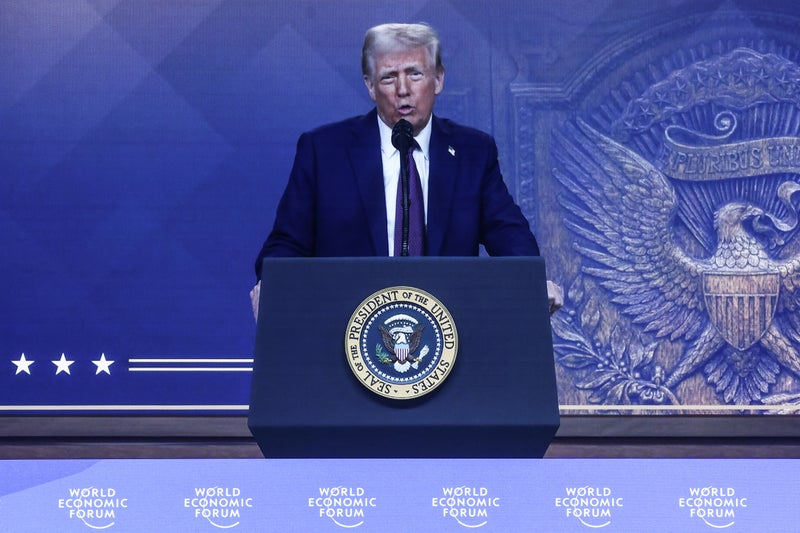Elon Musk’s crazed takeover of America’s financial plumbing risks shattering confidence in US institutions and in turn global financial stability. When Donald Trump gave an in-flight press conference en route to the Super Bowl last week, it generated a flurry of news, from the fresh threat of steel tariffs, to the declaration of, “Gulf of America day”. Much less remarked upon was a throwaway comment about the US’s financial obligations, which underlined the fact that tariffs are far from the only way in which Trump is jeopardising economic stability.
![[Heather Stewart]](https://i.guim.co.uk/img/uploads/2024/11/15/Heather_Stewart,_L.png?width=180&dpr=1&s=none&crop=none)
“We’re even looking at Treasuries,” the president told reporters. “There could be a problem … It could be that a lot of those things don’t count. In other words, that some of that stuff that we’re finding is very fraudulent, therefore maybe we have less debt than we thought.”. The suggestion was that opening up the US Treasury’s data to Elon Musk’s “department of government efficiency” team had identified a money-saving wheeze: why not walk away from some of America’s debt obligations – a “selective default”, as economists call it.
![[President Donald Trump speaks as Elon Musk carries his son X on his shoulders in the Oval Office.]](https://i.guim.co.uk/img/media/9081aa30ff6e3633b7df899d47cb6f6a14da110e/0_261_7827_4696/master/7827.jpg?width=445&dpr=1&s=none&crop=none)
Like so many of the serially erratic president’s pronouncements, this one had to be “walked back”, as the Americans call it. Kevin Hassett, his economic adviser, stressed the next day that Trump was referring to other payments that the US Treasury had been making – not its $36tn (£28.6tn) in debt obligations. Hassett suggested the Treasury “had been “sending money out without flagging what it was for”.
Yet just entertain for a moment the idea that a US administration might decide that it could unilaterally default on even a small portion of its debts. The result would be catastrophic. Because of the dollar’s status as the world’s reserve currency, the yield on US Treasuries – US government bonds – is perhaps the most important benchmarks in global financial markets. If investors suddenly began demanding a higher yield – effectively the interest rate – as insurance against the risk they would not get their money back, the effects would ripple through the trillions of dollars of other assets worldwide priced with reference to supposedly super-safe Treasuries.
Hassett made clear this is absolutely not an outcome the saner elements of Trump’s administration are aiming for. Indeed, Treasury secretary Scott Bessent has said the president wants to bring down the yield on 10-year US government borrowing costs. Yet as a result of Musk’s crazed takeover of the financial plumbing of the state, the US is already welching on its obligations – moral and financial – all over the world.
Every day seems to bring fresh examples: of health clinics in the developing world being closed because of the dismantling of the US Agency for International Development, or USAid; or researchers whose projects, funded by the National Institutes of Health, have been put on hold. Officials from the city administration in New York have even claimed the government effectively dipped into the city’s bank account, to claw back $80m in federal grants that had already been made.
This fast-track austerity is ostensibly aimed at improving the government’s balance sheet – putting the US through “the private equity wringer,” as Wired’s Brian Barrett put it last week. But the Musk/Trump takeover simultaneously risks shattering confidence in US institutions, in a way that is liable to have long-lasting and unpredictable consequences. Five former Treasury secretaries warned in an extraordinary New York Times editorial last week of the risks of letting Musk loose on the nation’s financial system.
“Any hint of the selective suspension of congressionally authorised payments will be a breach of trust and ultimately, a form of default. And our credibility, once lost, will prove difficult to regain,” they warned. Musk has faced legal action, and is targeting arms of government with which he has a particular beef, meaning the chances of anything that looks like a formal default, remain low. But the whole performance – as exemplified by a rambling Oval Office briefing involving Trump, Musk and his son X (who has the same name as the social media platform formerly known as Twitter) – screams “political risk”, as analysts would call it, if it was happening elsewhere in the world.
It would not be surprising if efforts to spur the development of alternative global reserve currencies and payments structures – such as those proposed by nations in the global south – are given added impetus by the shenanigans in Washington. The sheer insularity of the Trump administration’s approach was illustrated on Friday, when Bessent – supposedly one of the more sensible figures in the administration – said: “The US has a strong dollar policy, but because we have a strong dollar policy, it doesn’t mean that other countries get to have a weak currency policy.”.















.jpeg?trim=312,0,313,0&quality=75&auto=webp&width=1000)















